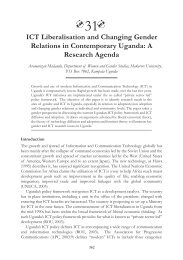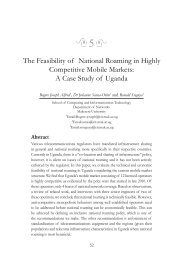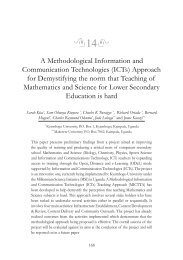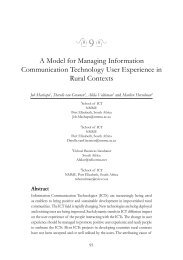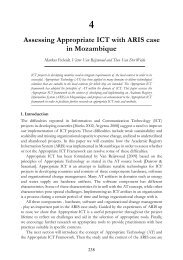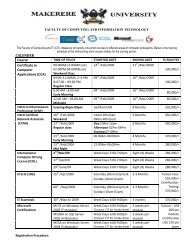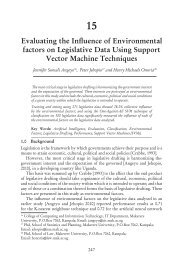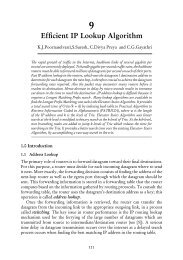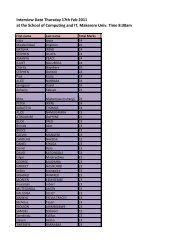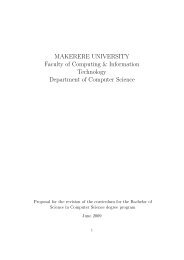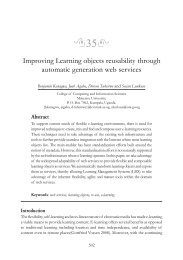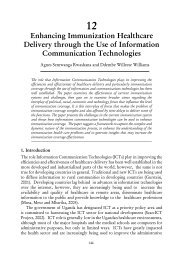John Matovu Aminah Zawedde Das Pamela and Herbert Ruhunde.pdf
John Matovu Aminah Zawedde Das Pamela and Herbert Ruhunde.pdf
John Matovu Aminah Zawedde Das Pamela and Herbert Ruhunde.pdf
Create successful ePaper yourself
Turn your PDF publications into a flip-book with our unique Google optimized e-Paper software.
52 Strengthening the Role of ICT in Development Volume VIII<br />
Journalism<br />
Journalism involves the investigation <strong>and</strong> reporting of events, trends <strong>and</strong> issues to<br />
a large audience.<br />
There seems to be consensus among scholars in the fi eld of journalism studies<br />
that what typifi es more or less universal similarities in journalism can be defi ned<br />
as a shared occupational ideology among news workers which functions to selflegitimize<br />
their position in society.<br />
Deuze [2007] suggests that journalists identify themselves more easily with the<br />
profession of journalism than for example with the medium or media company<br />
that employs them. Key characteristics of this professional self-defi nition can be<br />
summarized as a number of discursively constructed ideal-typical values.<br />
Golding <strong>and</strong> Elliott [1979]; Merritt [1995]; <strong>and</strong> more recently Kovach <strong>and</strong><br />
Rosenstiel [2001] describe these as:<br />
• Public service: journalists provide a public service (as watchdogs or<br />
‘newshounds’, active collectors <strong>and</strong> disseminators of information);<br />
• Objectivity: journalists are impartial, neutral, objective, fair <strong>and</strong> (thus)<br />
credible;<br />
• Autonomy: journalists must be autonomous, free <strong>and</strong> independent in their<br />
work;<br />
• Immediacy: journalists have a sense of immediacy, actuality <strong>and</strong> speed<br />
(inherent in the concept of ‘news’);<br />
• Ethics: journalists have a sense of ethics, validity <strong>and</strong> legitimacy.<br />
It is important to note here that these values can be attributed to other professions or<br />
social systems as well, <strong>and</strong> that these values are sometimes inevitably inconsistent or<br />
contradictory. To journalists this generally does not seem to be a problem, as they<br />
integrate such values into their debates <strong>and</strong> evaluations of the character <strong>and</strong> quality<br />
of journalism. In doing so, journalism continuously reinvents itself – regularly<br />
revisiting similar debates (for example on commercialization, bureaucratization,<br />
‘new’ media technologies, seeking audiences, <strong>and</strong> concentration of ownership)<br />
where ideological values can be deployed to sustain operational closure, keeping<br />
outside forces at bay. It is from this same premise that the discourse about citizen<br />
journalism emerges.<br />
Citizen Journalism:<br />
Citizen journalism is the concept of members of the public playing an active role<br />
in the process of collecting, reporting, analyzing <strong>and</strong> disseminating news <strong>and</strong><br />
information (it is also known as “public”, “participatory”, democratic or “street<br />
journalism”)<br />
Citizen journalism is one of the hottest buzzwords in the news business these<br />
days. Many news executives are probably thinking about implementing some sort<br />
of citizen-journalism initiative; a small but growing number have already done so.



